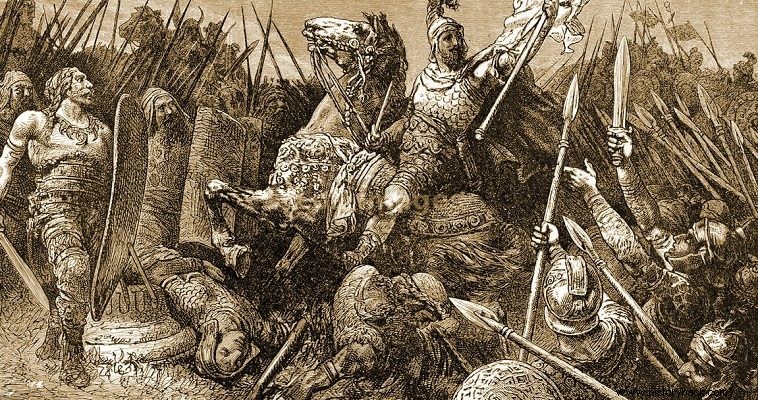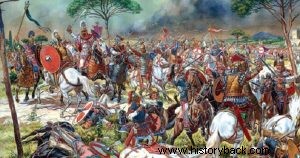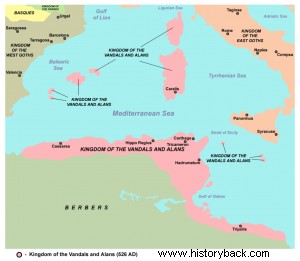
The Vandals were another Germanic nation, which under the pressure of the Huns, during the Great Migration of Peoples, had ended up inhabiting the area around the Sea of Azov. From there, seeking better fortune, they moved west and reached the Rhine.
They later settled in Spain and from there they eventually crossed into northern Africa. Under their king Jericho they established a powerful state. In one of the raids, Gizerich also conquered Rome (455 AD), which he razed, adding the word vandalism to the global vocabulary.
Until 533 AD Byzantium's relations with the Vandals could be characterized as neutral, to friendly. But then Gelimeros overthrew the legitimate king and seized the throne in a coup d'état, turning against the Eastern Empire, which supported the legitimate king. So Justinian decided to send the general Belisarius against the Vandals, at the head of a small force of 5,000 cavalry and 10,000 infantry.
Belisarius landed in North Africa and managed to defeat the Vandals at the Battle of Decimus. However, Gelimeros retreated with the army and prepared for a new battle in the area of Trikamaros, south of Carthage. The decisive battle of the war was fought there. Before the battle Belisarius spoke to his men.
“Admonition to you, men, I do not think I need make any, to you who have lately utterly defeated the enemy, and have made Carthage and the whole of Libya the property of your martial virtue. And I don't need to appeal to your courage, since as winners your fighting spirit remains in full bloom. Only one thing, I think it is the right time to remind you, that if you show the same bravery now you will cause the Vandals' hopes to collapse and thus end the war.
“So you have every reason to fight willingly in this conflict to see your labors come to fruition. As for the Vandals, you shouldn't even think about them, because the war is won neither by the number of people, nor by physical strength, but by the strength of the soul..."
These things Belisarius and his men said, and then he ordered John's general to take command of all the cavalry, except 500 choice Bucellarians whom he himself kept by his side. With the cavalry as the vanguard, the Byzantine Army moved to meet the enemy.
The Vandals decided this time to follow a defensive tactic and await the Byzantine raid behind the banks of a small stream. Gelimeros decided to arrange the army in two lines of battle. The first consisted exclusively of Vandal heavy horse divisions, led by Jazon's brother. Behind, in a second line, were 6,000 Moorish light horsemen.
And the Byzantine Army lined up in two battle lines. The first consisted exclusively of cavalry, deployed in an acrobolism arrangement, so as to cover the whole of the extended enemy front. Behind him deployed all the infantry and 500 Bucellarii, under the command of Belisarius himself. Suddenly Belisarius gave the signal to the cavalry leader John to attack the enemy center, with the aim of creating a bridgehead on the Vandal-controlled bank of the small river.
Belisarius decided to lure the Vandals into attacking him, ordering the general John to cross the river, with small forces, as a decoy. But the Vandals did not fall into the trap. . Belisarius then realized that the opponents intended to adopt a defensive posture, despite their numerical superiority. Thus he ordered John to launch continuous attacks against the enemy's center, but not to engage in massed combat, but to retreat when pressed and to return immediately afterwards.
John, reinforced with all the Bucellarians, followed the general's instructions to the letter. But each time his attacks were unleashed with more and more force and with more and more momentum. The Vandals, receiving the arrows of the Byzantine horsemen, tried to approach them to engage in individual combat with them. Then the more heavily armed Bucellarians intervened, who did not hesitate to engage the Vandals.
Finally, strongly pressed, John ordered a retreat. In a few minutes, however, the Byzantine cavalry attacked again, constantly straining the opponents. This time the Bucellarians opened the charge, supported by the arrows of the other horsemen, who followed in second echelon. Under the weight of the combined assault the enemy front began to show signs of inflection. Belisarius understood this and ordered the whole army to attack the Vandals now. At that moment a Bucellarius killed the Vandal king's brother. At the sight of his dead brother Gelimeros fled.
The Vandals, without leadership, and beaten by the entire Byzantine Army, collapsed. The Moors also their allies, seeing the disintegration of their front, also fled. The battle had ended with another proud victory for Belisarius. It was not because of losses that Belisarius had been victorious. The surviving Vandals, even without allies, outnumbered the Byzantines. It was their morale and will to resist that Belisarius had broken and that was the worst for them. Later Gelimeros was also captured and the Vandal state was finally overthrown.


